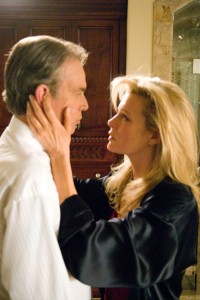The Informers
 I’ve never had a pony. I’ve never seen one do tricks. And yet, I somehow know what a one-trick pony is. I think the pony’s name is Bret Easton Ellis.
I’ve never had a pony. I’ve never seen one do tricks. And yet, I somehow know what a one-trick pony is. I think the pony’s name is Bret Easton Ellis.
Ellis, a showoffy, limited writer, revels in the shallowness of early-to-mid 1980’s Los Angelinos, had been adapted for the screen three times previous to The Informers, with Less than Zero, American Psycho, and The Rules of Attraction. The most accomplished and most entertaining of the novel adaptations is American Psycho, which, in book form, went from a hateful, misery-inducing, misanthropic, self-congratulatory and excessively violent, and most importantly, an endless navel gaze at the rich and clothing labeled, to, in film form, pretty much the same thing, but funny. Mary Harron’s version of American Psycho played like a satire of how empty the book was, and was carried by Christian Bale’s hilariously specific lead performance. It isn’t a perfect film, not even close, because it still has the bare bones of Ellis’ novel as a rope around its neck, but it seems the best way to handle his material for the screen, distance, irony, and virtually no respect.
 Gregor Jordan’s The Informers is in love with the source material (not surprising, seeing as Ellis is credited with the screenplay), which is its biggest problem. Does anyone still care about a bunch of vaguely gay/1983 versions of James Spader pretty boys who like cocaine, threesomes, and not caring about the world… Which is exactly why they do drugs and fuck whoever is handy. This revolving door of ennui is repetitive enough on its own, and is only further enhanced by pseudo-insightful dialogue (“I need to know what is good and what is bad. What happens when nobody tells you these things?*”), and inane attempts at profundity, such as a strung out rocker into young girls and boys who discovers the stigmata on his palm. Taking this all seriously would have to be nearly impossible on the set, so I don’t know what Jordan was expecting from the audience. The Informers has no particular insight apart from the typical, “empty people being empty,” an extension of Larry Clark syndrome, in which it becomes impossible to tell if the film is an exposure of the bored and stupid or just too lazy to develop the characters. But Jordan’s insistence on being sincere in his clichés causes the movie to go from amusingly dated to just dated (and plenty of anachronisms too, a reference to the movie Amadeus seems to forgot that it was released the year after The Informers takes place).
Gregor Jordan’s The Informers is in love with the source material (not surprising, seeing as Ellis is credited with the screenplay), which is its biggest problem. Does anyone still care about a bunch of vaguely gay/1983 versions of James Spader pretty boys who like cocaine, threesomes, and not caring about the world… Which is exactly why they do drugs and fuck whoever is handy. This revolving door of ennui is repetitive enough on its own, and is only further enhanced by pseudo-insightful dialogue (“I need to know what is good and what is bad. What happens when nobody tells you these things?*”), and inane attempts at profundity, such as a strung out rocker into young girls and boys who discovers the stigmata on his palm. Taking this all seriously would have to be nearly impossible on the set, so I don’t know what Jordan was expecting from the audience. The Informers has no particular insight apart from the typical, “empty people being empty,” an extension of Larry Clark syndrome, in which it becomes impossible to tell if the film is an exposure of the bored and stupid or just too lazy to develop the characters. But Jordan’s insistence on being sincere in his clichés causes the movie to go from amusingly dated to just dated (and plenty of anachronisms too, a reference to the movie Amadeus seems to forgot that it was released the year after The Informers takes place).
 What is likely to happen is that the movie will be remembered not for Kim Basinger’s slow transference into the plasticity in age defiance of Jennifer Tilly, Billy Bob Thornton’s standard hairpiece (playing a powerful Hollywood exec, but apparently producing something that sounds suspiciously like the Pia Zadora vehicle, Voyage of the Rock Aliens), or Mickey Rourke’s scuzzing up it as pedophile/child trafficker, but as Brad Renfro final performance before his drug overdose. Renfro, looking overweight, sweaty, fidgety, needy, and high, could have almost claimed his appearance as a tax deduction under the category of method acting, is perfect as Rourke’s nephew, pulled into his uncle’s criminal activities.
What is likely to happen is that the movie will be remembered not for Kim Basinger’s slow transference into the plasticity in age defiance of Jennifer Tilly, Billy Bob Thornton’s standard hairpiece (playing a powerful Hollywood exec, but apparently producing something that sounds suspiciously like the Pia Zadora vehicle, Voyage of the Rock Aliens), or Mickey Rourke’s scuzzing up it as pedophile/child trafficker, but as Brad Renfro final performance before his drug overdose. Renfro, looking overweight, sweaty, fidgety, needy, and high, could have almost claimed his appearance as a tax deduction under the category of method acting, is perfect as Rourke’s nephew, pulled into his uncle’s criminal activities.
 Of course Renfro’s subplot (of the many intertwining stories) is bungled by the approach to the material; Ellis’ need to shock never works when he’s still afraid of crossing certain cultural boundaries. Unlike with the way director Roger Avary handled The Rules of Attraction, the humor in The Informers is unintentional, exacerbated by the interchangeable characters and sexual partners. No one in particular stands out, and so when the one lady who sleeps with everyone is questioned about cheating on her boyfriend, it is easy to forget which one of the Raybanned bleach-blonds being referred to.
Of course Renfro’s subplot (of the many intertwining stories) is bungled by the approach to the material; Ellis’ need to shock never works when he’s still afraid of crossing certain cultural boundaries. Unlike with the way director Roger Avary handled The Rules of Attraction, the humor in The Informers is unintentional, exacerbated by the interchangeable characters and sexual partners. No one in particular stands out, and so when the one lady who sleeps with everyone is questioned about cheating on her boyfriend, it is easy to forget which one of the Raybanned bleach-blonds being referred to.
* I’m pretty sure that was the whole reason religion was invented. If I was him, I wouldn’t worry about cleaning himself up to be inundated with holiness, there’s plenty of hypocritical God-fearing folk.



